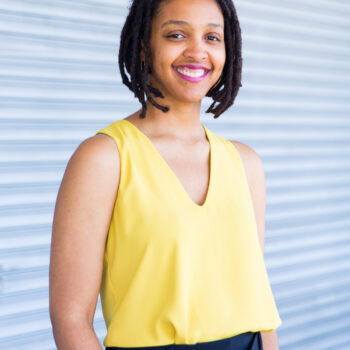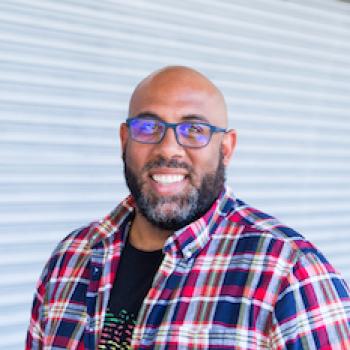In the opening episode of season two of Racism Is Profitable, Pablo Rodriguez of Communities for a New California (CNC) joins Solana Rice and Jeremie Greer to talk about the work they’re doing at the local and state level to organize Black and brown folks, change the electoral terrain, and push candidates to earn their votes. Check out the transcript below or listen to the full episode.
Solana Rice: Last time we were together, we were talking about all of the conversations that you all at CNC are having across the San Joaquin and Coachella Valleys in California. I wonder, can you share with the audience just a little bit about those conversations, who you’re talking to, what they’re telling you?
Pablo Rodriguez: CNC actually does work in 17 counties in California. So, they’re in the San Joaquin Valley, the Sierra Foothills, and the Coachella Valley. We are a multi-issue organization. And so we are working with people who essentially are facing the economic fallout of the pandemic, bleak job opportunities, a housing crisis that is leaving people behind and pushing families out of their homes, climate change in the form of toxic drinking water, pervasive health issues. We’re talking about the impact of climate change specific to wildfires, drought, and pesticide use. So, that’s broadly what it is that we work on.
CNC builds neighborhood committees to finish unfinished neighborhoods and address these issues. And since meeting you all a couple of years ago, I’m happy to say that we formed these committees as a way to address that we need to end the profitability of white supremacy and end the theft, exploitation, and exclusion of brown, Black, Indigenous, and families of color across California. And so for us, we just focus on the rural areas of California, which are now battlegrounds in congressional races across the country.
SR: I noticed that you emphasize battlegrounds. Isn’t it just a swing district?
PR: Swing district makes it seem like it’s only Democrat versus Republican in a place. It could swing one way or the other. And in the six districts that we are talking about, nearly 30% of registered voters are registered as independent voters. So, there are independent voters who feel strongly that neither political party nor candidates representing those parties are doing enough to earn their votes. We did a lot of work making sure that there was a complete count with the census. And the census, which triggers redistricting, has resulted, in the San Joaquin Valley, in the battlegrounds that I’m talking about, which were formerly thought to be conservative strongholds. There are now three new Latino majority congressional districts.
But I want to be really clear, when you hear “new majority Latino district,” you need to think about Latina women and Latina women voting power, because consistently, Latina women outvote Latino men by a margin of 54 to 46%. And so the path towards victory, if a candidate wants to win, and I’ll talk about some of these folks that are running, needs to address issues that are being faced by Latina women. And you need to center that in order to ensure victory. Otherwise, you are doing yourself not only in disservice, but you’re on a path towards defeat.
Jeremie Greer: So, you mentioned these independent voters, people coming in and recognizing themselves as independent. And in a national context, that’s usually signaling that they may be attracted to conservative issues, or they may be center left, but that means that they would never support progressive ideas, like $15 minimum wage, for example, or things like that. That’s the kind of conventional wisdom. Do you think that applies?
PR: No, period. We have toxic drinking water in both the Coachella Valley and the San Joaquin Valley, and many areas of the Sierra Foothills. The air is now toxic to breathe, depending on where we’re at, because of the use of pesticides. Or in the Sierra Foothills, because of now rampant wildfires, where the fire season lasts about nine months out of the year. And that didn’t used to be the case. We are going into what we used to call fall. And fall used to start in September. We don’t have fall anymore. We will have 100 plus degree temperatures right before my birthday in October, and those used to be days that were very cool. That doesn’t happen anymore. So because we are able to see the reality of what’s around us, but many young people who are growing up in these regions, and so I’ll say Latinos and generation Z, are not necessarily buying into the party politics — that there’s one good guy versus a bad guy.
Democrats, for the lack of results on issues related to climate change, and Republicans for denying that COVID is real, that climate change is real, they’re not the good guys either. So, to go to your question, what I argue is that if you grew up in these regions and you’re a young person or a Latino, you are inherently a progressive person.
SR: And Pablo, I just want to make sure that folks understand the size of the areas that you’re talking about. We’re talking about millions of people, right?
PR: Yeah. So, if you were to combine the regions that we’re talking about, the Coachella Valley and the San Joaquin Valley, and the Sierras, we’re larger than Georgia. We’re more than 10 million people.
SR: Pablo, the stakes are fairly high in these races. And as you mentioned, some of the candidates aren’t our ideal candidates and we need to support them. How do you balance those two when you’re talking to folks and how are you also rooting out the folks that just really, we should not be supporting?
PR: That’s a really difficult question because I think that what we’ve demonstrated over the last 10 years is that we definitely have electoral power when we’re able to flex our muscle as voters of color. As an organization, what I share with people is that, I may not be able to bring you to 50% plus one so that you could win as a candidate, but the voters who we engage are consistently between 4% to 10% of the vote share in any given election. Our work that we do as an organization may not be the reason that you win, but it definitely can be the reason that you lose. That’s the way that we frame our work. That’s why you need to take it seriously.
The challenge is the recruitment of candidates. The funding of campaigns is incredibly hard because, although we’ve had people who we were hoping would run again, you need to raise over $2 million just to be viable. In 2008, if you could raise $200-300,000, you were viable in Congress. But since Citizens United, that’s completely changed. And the money in politics is obscene.
JG: You all have real insight into what the community cares about because you’ve talked to these people and you’re collecting this data, you talk to people. But the way we know politics are done is they send these consultants in that bring these analyses around what they think is happening. They look at the place you are. They think, “Oh, it’s rural, it’s a lot of folks of color, so voter turnout’s going to be low,” all the tropes. Why are they not talking to folks like you who absolutely know what these people are concerned with?
PR: On the Democratic side, the myth was the San Joaquin Valley and the Coachella Valley are conservative strongholds, we’re going to lose there, let’s put our money elsewhere. As a result, it’s by no accident that these districts now have 30% independent voters. The parties have not earned their votes. Organizations like ours had to be born because there was a vacuum.
There’s a self perpetuating thing that ends up happening where you will say, “Look, in the primary, the highest propensity voters are white families and white voters, they’re homeowners. I’m going to focus on them, and then in the general election, when there’s more people of color, then I’ll focus and change gears.” What ends up happening is that you might end up getting a subscription to Political Data Intelligence. If you’re a candidate and it’s hard to raise money, you might pay to get one of their pre-created voter universes. And those universes eliminate right off the bat, even if it’s the one with the lowest propensity voters, tens of thousands of voters of color. In these districts, consistently, 10 to 15% of voters who are Latino, who are identified as inactive voters, are not included in those pre-create universes.
If you have a subscription and you’re wise and have some experience, you know that you have to create your own universe and not just go buy a list from PDI, right? But there’s not enough of those candidates that have general consultants that are telling them, “Let’s go expand the electorate.” Instead, what they’re saying is, “Here’s the list of the highest propensity voters that PDI has already given to us. Let’s just call them and let’s pull them.” And there’s another pitfall in what I’m saying because if you have money for polling, who do you poll? If you have enough money in your campaign to poll, who are you calling? Again, the voters that I just mentioned are not included in your list, so the things that are important to voters who are the majority of these districts are not getting engaged and as a result, you’re not earning their votes.
JG: Even the data that they’re using to make these decisions are racist.
PR: Yeah. I mean, for us, we work our list to exhaustion, right? We’re actually knocking on their doors. What we find is that many of the folks will just say, “I’ve never had a candidate come to my house. I’ve never had an organization come to my door, other than you all that have been bugging me for the last 10 years.” But they still are not necessarily showing up.
SR: What do you want folks in other states to know about how these outcomes might affect them? You talked about census outreach and being able to really use the census as a way to continue the relationship building. But also to get real numbers and to actually change the electoral calculus. So, it strikes me that there is an amount of infrastructure that folks can be advancing in their states, if they don’t have it.
PR: What I think is really important to say is, text messaging is not going to get you there. Phone banking is not going to get you there. You need to be doing the work year round. I think that there’s many of us who have learned that lesson. What I look forward to is just being able to continue to come together nationally, to keep on banging that drum so that whether you’re independent or whether you belong to a political party, that we are battling on ideas.


